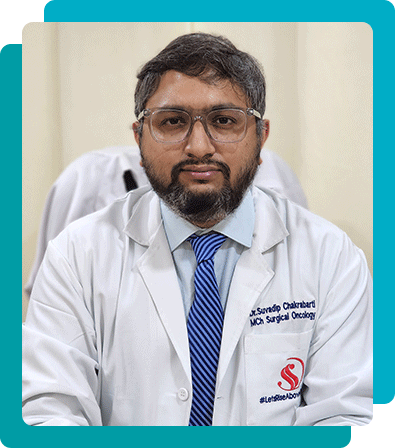Throat Cancer Surgeon in Kolkata
Dr. Suvadip Chakrabarti

What is Throat Cancer?
Types of Throat Cancer
- Nasopharyngeal Cancer
- Hypopharyngeal Cancer
- Oropharyngeal Cancer
- Glottic Cancer
- Supraglottic Cancer
- Subglottic Cancer
Symptoms of Throat Cancer
Persistent sore throat:
A sore throat that doesn’t go away after a couple of weeks.
Hoarseness:
Changes in your voice, like hoarseness or difficulty speaking clearly.
Difficulty swallowing:
Pain or discomfort when swallowing food or liquids.
Ear pain:
A persistent ache in one or both ears.
Lump in the neck:
A noticeable lump or swelling in the neck area.
Unexplained weight loss:
Losing weight without trying.
Coughing up blood
Coughing up blood or mucus that contains blood.
Causes of Throat Cancer
Primary Factors

Tobacco use
Smoking cigarettes is a major contributor to throat cancer.

Excessive alcohol consumption
Drinking large amounts of alcohol regularly increases the risk.

Human Papillomavirus (HPV)
Certain types of HPV, particularly HPV 16 and 18, are linked to throat cancer.
Other Throat Cancer Reasons

Diet
A diet low in fruits and vegetables can increase risk.

Gastroesophageal reflux disease (GERD)
Chronic acid reflux can irritate the throat.

Exposure to certain chemicals
Occupational exposure to substances like asbestos, nickel, or sulfuric acid can be a factor.

Weakened immune system
People with HIV or those undergoing organ transplants are at higher risk.
The Stages of Throat Cancer
Stage 0: Abnormal cells are present but haven’t invaded deeper tissues.
Stage I: A small tumour is present, without spreading to lymph nodes.
Stage II: A larger tumour, possibly with spread to nearby tissues.
Stage III: Tumour has grown larger or spread to lymph nodes.
Stage IV: Cancer has spread to distant parts of the body.
A higher stage of cancer signifies a more advanced state of the disease.
Treatments of Throat Cancer
Surgery
Throat cancer surgery involves the following:
Removal of the tumour
For smaller tumours, surgery may be used to completely remove the cancerous tissue.
Laryngectomy:
This involves removing the entire larynx (voice box), often necessary for advanced laryngeal cancer.
Pharyngectomy:
This throat cancer operation involves removing part of the pharynx.
How to Prevent Throat Cancer?
Quit smoking:
By quitting smoking, you can effectively reduce your risk of developing throat cancer.
Limit alcohol consumption:
Avoid excess consumption of alcohol as it can increase your chances of getting throat cancer.
Maintain a healthy diet:
Consuming plenty of fruits and vegetables can help protect against cancer.
Get vaccinated:
The HPV vaccine can protect against certain types of throat cancer linked to HPV.
Regular dental check-ups:
Good oral hygiene can help detect early signs of potential issues.
Frequently Asked Questions (FAQs)


